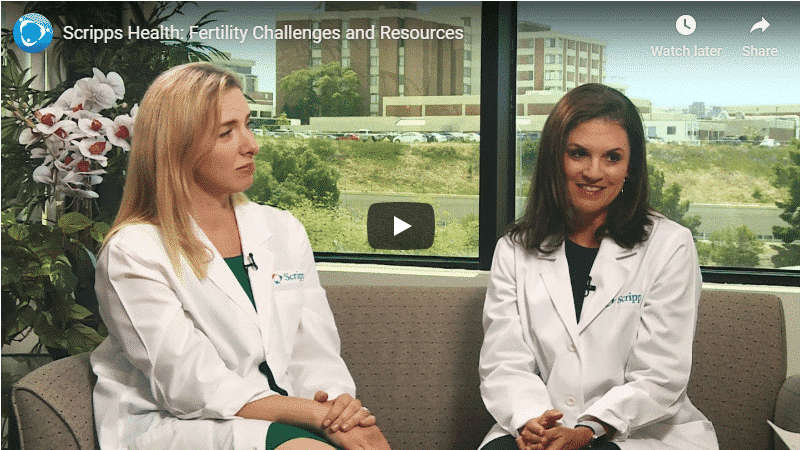
Fertility Issues and Miscarriage (video)
Fertility specialists discuss causes and treatments for infertility
Deciding to start a family can be an exciting time. However, for women who have been trying without success to have a baby, excitement often gives way to frustration and disappointment. According to the Centers for Disease Control (CDC), about 12 percent of women aged 15 to 44 years in the United States have difficulty getting pregnant or carrying a pregnancy to term.
In this video, San Diego Health host Susan Taylor talks about fertility issues and infertility treatment options with Renee Nelson, MD, an obstetrician and gynecologist (OB-GYN) with Scripps Clinic La Jolla, and Brooke Friedman, MD, an OB-GYN and fertility specialist at Scripps and the San Diego Fertility Center in San Diego.
What is infertility?
In general, the CDC defines infertility as being unable to become pregnant after at least one year of trying to conceive. It can also include women who do become pregnant but lose the pregnancy to miscarriage.
“Infertility can cause a tremendous emotional toll on both women and their partners, but it is important to remember that they are not alone,” says Dr. Friedman. “It’s very common and it’s a medical disorder like any other, and we do have very effective treatments.”
Age is the leading cause of infertility
In women, age is the most common cause of infertility; as a woman ages, the quality of her eggs declines, making it more difficult to conceive and carry a baby to term.
Not only is there a decline in fertility, but an increased risk of miscarriage as well. Over time, a woman’s eggs age and accumulate genetic mutations like missing or extra chromosomes. Those mutations make it more difficult for the egg to successfully implant in the uterus and develop into a healthy embryo.
“Most miscarriages are due to abnormalities in the embryo,” says Dr. Nelson. “We always try to emphasize if someone has gone through a miscarriage, it’s not her fault. I always tell patients, it’s like Mother Nature knows that this isn’t normal and is taking care of the problem.”
Physically, the best age for women to reproduce is in their early 20s.
“In your 20s you have a 90 or 95 percent chance of conceiving within a year,” Dr. Nelson says. “However, many women are not psychologically or financially ready to have children at that age, and they wait. Up to about age 35, your chances are still 75 to 80 percent. Then it really starts declining, especially after 40.”
Other fertility factors
Irregular menstrual periods, often due to hormonal imbalances or other causes, may mean that a woman is not ovulating regularly; some women may not ovulate at all.
Endometriosis, a condition in which the uterine lining grows outside of the uterus, can cause scar tissue that can interfere with conception.
Non-cancerous growths in the uterus called uterine fibroids can affect fertility if they develop in an area where the embryo needs to grow.
In about 25 percent of couples experiencing infertility, the man’s sperm count or quality may be to blame. “Sperm that are an abnormal shape or move too slowly may not be able to fertilize a woman’s egg,” says Dr. Nelson. “Some men produce no sperm at all.”
Infertility treatment options
When should you seek medical care for infertility? In general, women under 35 should contact their OB-GYN if they have been trying unsuccessfully to get pregnant for a year or more. Women older than 35 should wait about six months. Women who have irregular menstrual cycles shouldn’t wait to see their physician if they’re trying to conceive.
Testing to determine the cause of infertility is the first step.
“We have to gather the puzzle pieces. We may look at egg supply, make sure the fallopian tubes are open, check out the male partner and do an analysis of the sperm,” says Dr. Friedman. Other tests may include measuring hormone levels and doing an ultrasound of the woman’s uterus and ovaries.
Depending on the results, various treatment options may be available to help women have a successful pregnancy. These include medications to help with ovulation, intrauterine insemination (IUI), in-vitro fertilization (IVF) and other options.
“It’s important if you’re struggling to conceive to try to get some answers,” says Dr. Friedman. “Knowledge is power, so when you have information you’re in a better position to really evaluate your next steps.”
This article originally posted on scripps.org.

Join our Senior Wellness Society for the latest news on Medicare and tips for healthy living in San Diego!
Sign up now ›Are you looking for specialized medical care in San Diego?
Our directory has more than 850 doctors in San Diego County of various specialties who are available to help you.
Find a doctor